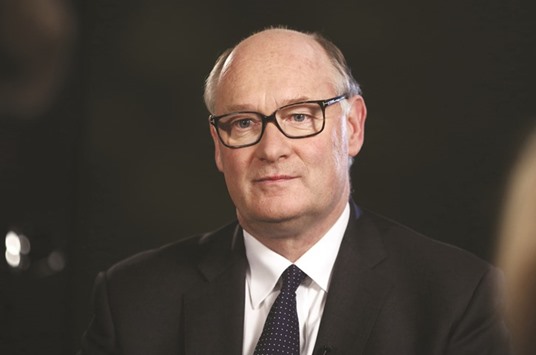Finance executives say they are preparing for the worst on Brexit as Prime Minister Theresa May signalled she plans to pull the UK out of the European single market.
“If you don’t know where you are going, you have to plan for the worst and execute faster,” HSBC Holdings chairman Douglas Flint said in a speech at the World Economic Forum in Davos. “This isn’t rocket science.” Businesses want to know, “what is the ambition? And how does one deal with the transition? Is it the dreaded cliff edge or is there some kind of standstill.”
Banks, bracing for the loss of their right to sell services freely around the EU from London, are set to start the process of moving operations into the eurozone within weeks of the government triggering Brexit talks, which is scheduled to happen by the end of March. The prime minister will say in a London speech later yesterday that she expects Britain to leave the single market and overhaul its links to the customs union, according to a person familiar with the matter.
The “working assumption” is that banks will lose access, UBS Group chairman Axel Weber said in an interview with Bloomberg in Davos. “It’s important to create optionality now, but let’s see what the final agreement is.”
Aberdeen Asset Management chief executive officer Martin Gilbert said it was time for banks to decide whether they were going to move to Dublin, Paris or Frankfurt.
“You have to work out where you are going and you have to plan for the worst and hope for the best,” Gilbert said.
Global bank chiefs have warned May that they will soon start shifting operations and jobs from the UK to elsewhere in Europe unless she can protect their easy access to its market. To avoid the need for preemptive staff moves outside Britain, banking leaders have asked for an interim agreement soon after May triggers the Article 50 exit clause, kicking off a two year transition period. None have so far moved people abroad or formally applied for banking licences.
It’s “still premature” to make decisions on Brexit, Bank of America Corp President Brian Moynihan told reporters in Davos. “London will be an important part of our company no matter what. We have to wait for the rules to get developed.”
Standard Chartered has approached Irish and German officials about making Dublin or Frankfurt its legal base inside the EU once Britain begins the formal process of withdrawing from the EU, people familiar with the discussions said in December.
Citigroup is in discussions with German regulator BaFin about moving some of its London-based equity and interest rate derivatives traders to Frankfurt, Bloomberg reported in December. The US firm is also talking with the European Central Bank and regulators in EU nations including Ireland about relocating other parts of their operations elsewhere.
In September, UBS CEO Sergio Ermotti said he may have to move as many as 1,500 jobs from the UK to elsewhere in the region after Brexit. Before the June 23 referendum, HSBC said a vote to quit the UK would likely see the bank relocate as many 1,000 people to Paris. JPMorgan Chase & Co said at the time that 4,000 jobs could be at risk.
Ireland’s minister in charge of financial services said he expects a wave of UK-based firms to decide to relocate to the country by mid-2017.
Financial companies “have been coming by and meeting with me, and other ministers and the central bank and making preliminary inquiries into office space and staff,” Eoghan Murphy, minister of state at the Department of Finance, said in an interview in Hong Kong. “We think the first concrete decisions in terms of communications to the public are going to be Q1 and Q2.”
He declined to name any of the companies that are in talks with Ireland’s government about relocation, though he said they include US and Japanese firms.

u201cIf you don’t know where you are going, you have to plan for the worst and execute faster. This isn’t rocket science,u201d HSBC Holdings chairman Douglas Flint said in a speech at the World Economic Forum in Davos.
